
Thursday, May 23, 2013
Movie Review : We're Not Broke (Social Activism)
Last night, Lewis and I saw the independent film, "We're Not Broke". Go see it! Decades ago, the public was ignorant of political/business corruption: Boss Tweed got away with it because city constituents couldn't read newspapers, FDR was able to request that reporters keep his quotes "off the record" and they complied, NYC Mayor Beau James got away with it because there were no cellphone cameras, blogs or Facebook posts to spread the alert. The movie shows documentation and financial experts that confirms what the public can already tell: that something has been wrong for a long time when a country gets more wealthy but the living costs get worse than prior generations. You can probably guess why... corporations get the government to allow them advantages to be more profitable, and the general public suffers by paying the difference in taxes and going without public services (as a result of gov't cutbacks). And the people, who hire and pay for those politicians--and who buy those products/services--and who work for the companies, mildly go along with it. In Iceland, Ireland, Italy, Egypt, France and Greece, they held violent riots, upset that their governments had squandered their resources. In America, the people have to get out of their Lazy-Boys, get off the couch, turn off the online porn, leave Happy Hour and do something productive. They have to collectively take a day off from work/school and proceed to their town hall/state capitol and demand explanations/action/reverse policy. They have to hire pro-people lawyers and economists. They have to hold their camera phones up to their elected councilmen, assemblymen, senators, mayors, governors, legislators, and presidential staffers to demand answers--with deadlines. If government, that supposedly represents the people and works for the people, has made national policy changes that effectively hurts the people, then they should be fired. If they've made policy that hurts the nation, that might be considered treason. If they've used your tax dollars to change policy that allowed Enron to show "projected profits" on its Financial Reports (to scam the public with inflated stock prices")--which used to be illegal, then they should pay for it. If they've changed policy that allows companies to make profits in America but not pay ANY taxes in America (leaving the burden to their consumers/tax payers), then those politicians should be removed.
A clever 1970s movie, "The Network" offered some quotes that are still relevant today:
"I don't have to tell you things are bad. Everybody knows things are bad. It's a depression. Everybody's out of work or scared of losing their job. The dollar buys a nickel's worth, banks are going bust, shopkeepers keep a gun under the counter. Punks are running wild in the street and there's nobody anywhere who seems to know what to do. We know the air is unfit to breathe and our food is unfit to eat, and we sit watching our TV's while some local newscaster tells us that today we had fifteen homicides and sixty-three violent crimes, as if that's the way it's supposed to be. It's like everything everywhere is going crazy, so we don't go out anymore. We sit in the house, and slowly the world we are living in is getting smaller, and all we say is, 'Please, at least leave us alone in our living rooms. Let me have my toaster and my TV and I won't say anything. Just leave us alone.' Well, I'm not gonna leave you alone. I want you to get mad! I don't want you to protest. I don't want you to riot - I don't want you to write to your congressman because I wouldn't know what to tell you to write. All I know is that first you've got to get mad. You've got to say, 'I'm a HUMAN BEING, God damn it! My life has VALUE!' So I want you to get up now. I want all of you to get up out of your chairs. I want you to get up right now and go to the window. Open it, and stick your head out, and yell, 'I'M AS MAD AS HELL, AND I'M NOT GOING TO TAKE THIS ANYMORE!' Things have got to change. But first, you've gotta get mad!... You've got to say, 'I'm as mad as hell, and I'm not going to take this anymore!' Then we'll figure out what to do about the depression and the inflation and the oil crisis. But first get up out of your chairs, open the window, stick your head out, and yell, and say it: "I'M AS MAD AS HELL, AND I'M NOT GOING TO TAKE THIS ANYMORE!"
Later on, the same jaded journalist continues: "Edward George Ruddy died today! Edward George Ruddy was the Chairman of the Board of the Union Broadcasting Systems, and he died at eleven o'clock this morning of a heart condition, and woe is us! We're in a lot of trouble! [calmly strolling toward the audience] So. A rich little man with white hair died. What has that got to do with the price of rice, right? And *why* is that woe to us? Because you people, and sixty-two million other Americans, are listening to me right now. Because less than three percent of you people read books! Because less than fifteen percent of you read newspapers! Because the only truth you know is what you get over this tube. Right now, there is a whole, an entire generation that never knew anything that didn't come out of this tube! This tube is the Gospel, the ultimate revelation. This tube can make or break presidents, popes, prime ministers... This tube is the most awesome God-damned force in the whole godless world, and woe is us if it ever falls in to the hands of the wrong people, and that's why woe is us that Edward George Ruddy died. Because this company is now in the hands of CCA - the Communication Corporation of America. There's a new Chairman of the Board, a man called Frank Hackett, sitting in Mr. Ruddy's office on the twentieth floor. And when the twelfth largest company in the world controls the most awesome God-damned propaganda force in the whole godless world, who knows what shit will be peddled for truth on this network? So, you listen to me: Television is not the truth! Television is a God-damned amusement park! Television is a circus, a carnival, a traveling troupe of acrobats, storytellers, dancers, singers, jugglers, side-show freaks, lion tamers, and football players.
(Think "Fashion Police" "Entertainment Tonight" "Real World" "Real Housewives" "Jersey Shore")
We're in the boredom-killing business! So if you want the truth... Go to God! Go to your gurus! Go to yourselves! Because that's the only place you're ever going to find any real truth. But, man, you're never going to get any truth from us. We'll tell you anything you want to hear; we lie like hell. We'll tell you any shit you want to hear. We deal in *illusions*! None of it is true! But you people sit there, day after day, night after night, all ages, colors, creeds... We're all you know. You're beginning to believe the illusions we're spinning here. You're beginning to think that the tube is reality, and that your own lives are unreal. You do whatever the tube tells you! You dress like the tube, you eat like the tube, you raise your children like the tube, you even *think* like the tube! This is mass madness, you maniacs! In God's name, you people are the real thing! *WE* are the illusion! So turn off your television sets. Turn them off now. Turn them off right now. Turn them off and leave them off! Turn them off right in the middle of the sentence I'm speaking to you now! TURN THEM OFF...
However, the new Chairman of the Company (representing how Rockefeller or the CEO of GE or the CEO of GM probably thought/thinks) reprimands the journalist: "You have meddled with the primal forces of nature, Mr. Beale, and I won't have it! Is that clear? You think you've merely stopped a business deal. That is not the case! The Arabs have taken billions of dollars out of this country, and now they must put it back! It is ebb and flow, tidal gravity! It is ecological balance! You are an old man who thinks in terms of nations and peoples. There are no nations. There are no peoples. There are no Russians. There are no Arabs. There are no third worlds. There is no West. There is only one holistic system of systems, one vast and immune, interwoven, interacting, multivariate, multinational dominion of dollars. Petro-dollars, electro-dollars, multi-dollars, reichmarks, rins, rubles, pounds, and shekels. It is the international system of currency which determines the totality of life on this planet. That is the natural order of things today. That is the atomic and subatomic and galactic structure of things today! And YOU have meddled with the primal forces of nature, and YOU... WILL... ATONE! Am I getting through to you, Mr. Beale? You get up on your little twenty-one inch screen and howl about America and democracy. There is no America. There is no democracy. There is only IBM, and ITT, and AT&T, and DuPont, Dow, Union Carbide, and Exxon. Those are the nations of the world today. What do you think the Russians talk about in their councils of state, Karl Marx? They get out their linear programming charts, statistical decision theories, minimax solutions, and compute the price-cost probabilities of their transactions and investments, just like we do. We no longer live in a world of nations and ideologies, Mr. Beale. The world is a college of corporations, inexorably determined by the immutable bylaws of business. The world is a business, Mr. Beale. It has been since man crawled out of the slime. And our children will live, Mr. Beale, to see that... perfect world... in which there's no war or famine, oppression or brutality. One vast and ecumenical holding company, for whom all men will work to serve a common profit, in which all men will hold a share of stock. All necessities provided, all anxieties tranquilized, all boredom amused. And I have chosen you, Mr. Beale, to preach this evangel."
It was recently brought to my attention that the 2012 comedy, "The Dictator" had this quote from its main character, General Aladeen: "Why are you guys so anti-dictators? Imagine if America was a dictatorship. You could let 1% of the people have all the nation's wealth. You could help your rich friends get richer by cutting their taxes. And bailing them out when they gamble and lose. You could ignore the needs of the poor for health care and education. Your media would appear free, but would secretly be controlled by one person and his family. You could wiretap phones. You could torture foreign prisoners. You could have rigged elections. You could lie about why you go to war. You could fill your prisons with one particular racial group, and no one would complain. You could use the media to scare the people into supporting policies that are against their interests."
Food for Thought: In December 2011, the non-partisan group "Public Campaign" criticized General Electric for spending $84 million on lobbying, while not paying any taxes during 2008-2010, but getting $4.7 billion in tax rebates... despite making a profit of $10.4 billion, laying off 4,168 workers since 2008, and increasing executive pay by 27% to $75.9 million in 2010 for the top 5 executives.
I would disagree that business does things for the betterment of society. A look at bottled water, fast food, car companies, insurance companies, banks, Pfizer and cigarette companies says differently. The people must maintain checks and balances by keeping up the scrutiny, the vigil, the participation and the pressure. That's how you got Women's' Rights, Gay Rights, Racial Equality, Fair working conditions during the Industrial Revolution, and even the Bill of Rights, to begin with. It's how the small heroes win: the bigger they are, the harder they fall.
Thursday, May 16, 2013
Young Integrity
Instead of the dead-brain themes of "Barney the Dinosaur" and "Blue's Clues" on television, I grew up watching smartly-created shows for kids: "Mr. Wizard", "Mr. Rogers", "Pinwheel House", "Sesame Street", and "The Muppets". They discussed cultural diversity, how things work, how things are made, social responsibility, jazz (cohesiveness, spontaneity, solos, interpretation), musical theatre, and understanding Nature. Compare that with the "money for nothing and checks for free" attitude on today's TV shows.
Kids were treated like people... instead of being treated like idiots and developing a
sense of entitlement via "Real Housewives" and "Real World". Learning takes modesty. A balance in behavior takes conscience. As a child, if I was wrong, I learned why... and I did something about it. No trauma. No drama. But now people whine, "Boo hoo, he told me that I was wrong. I demand financial compensation." (They sound like many spoiled customers in America's retail and hospitality sectors). It's no wonder that typical people can't handle "reality" anymore: they never see it while growing up!
Ah yes, the lottery
The New York Lottery is pulled every week. Encompassing 44 multi-state jurisdictions, the Mega Millions Lottery and Powerball Lottery are weekly games. One of the highest prizes was $650,000,000. However, the usual odds of winning are 1 in 175,700,000 people (half the USA population). The NYS lottery was "supposed to be" for funding the public schools... and we can see how well that's going! But, it was a nice sales pitch--"It's for the children!" (just like the sales pitch of engraving on the Statue of Liberty to lure cheap labor).
The interesting--perhaps glaring--aspect is that nobody accounts for where all that money goes. I imagine that if routed properly, this republic nation of ours could have plenty of funds for public works, civic improvement projects, parks, school standards, et cetera. The lottery tickets can only be bought with cash, and my experience with ANY business that deals in cash is that the money is never reported/accounted for accurately. (More-so than your local Chinese grocery store, the lotteries are HUGE collectors of income). Most winners choose the upfront-cash option, so the Lottery Consortiums and government take back about half (which should be accounted for in tax breaks for the rest of us). The other thing to consider is... how much money the Lotteries took in? Lets say the NYS Lottery is $10 million dollars. What if 14 million people bought $1 tickets? The winner chooses the lump-sum winnings (half the value) of $5 million, and the Lottery and government keep $9 million!
What a great way to raise money whenever you want! If you suddenly need $150 million (and oil or currency exchanges aren't fast enough), you can just forestall a winning Mega Millions until the jackpot is $300 million. At $2 per ticket, if half the American population plays, you'll probably get more than $300 million and when the winner(s) take the immediate payment, you can keep the rest... and repeat the cycle the next month or a few months later. Who says there's a recession?
The interesting--perhaps glaring--aspect is that nobody accounts for where all that money goes. I imagine that if routed properly, this republic nation of ours could have plenty of funds for public works, civic improvement projects, parks, school standards, et cetera. The lottery tickets can only be bought with cash, and my experience with ANY business that deals in cash is that the money is never reported/accounted for accurately. (More-so than your local Chinese grocery store, the lotteries are HUGE collectors of income). Most winners choose the upfront-cash option, so the Lottery Consortiums and government take back about half (which should be accounted for in tax breaks for the rest of us). The other thing to consider is... how much money the Lotteries took in? Lets say the NYS Lottery is $10 million dollars. What if 14 million people bought $1 tickets? The winner chooses the lump-sum winnings (half the value) of $5 million, and the Lottery and government keep $9 million!
What a great way to raise money whenever you want! If you suddenly need $150 million (and oil or currency exchanges aren't fast enough), you can just forestall a winning Mega Millions until the jackpot is $300 million. At $2 per ticket, if half the American population plays, you'll probably get more than $300 million and when the winner(s) take the immediate payment, you can keep the rest... and repeat the cycle the next month or a few months later. Who says there's a recession?
Saturday, May 11, 2013
Walking Tour : Revitalized Lincoln Center
It is soooooo nice when the EXPERIENCE of going to the movies is a pleasant surprise. (While the film can be nice, the arrival, ticket buying, navigating through theatre, choices of junk food, dirtiness of theatre, finding a seat… isn't). A few nights ago, Lewis wanted to see the documentary film about Bergdorf Goodman, and he picked the cozy but sleek new theatre at Lincoln Center. Let me begin there!
When Lincoln Center was built (by Rockefeller funds), it was a marvel in that it was the first effort to make a plaza containing a city's ballet company, orchestra and opera house. Sadly, it was designed--despite the team of talented architects--with dismal results (above). Anyone who's travelled can tell you that a city or town has a sense of community/heart (and good feng shui) when there are places for the public to gather, commune with nature, socialize, and spend money.
Lincoln Center was built like a fortress--an outpost for the cultural-minded amidst the ragtag Upper West Side bohemians. It was obviously made for patrons with cars arriving at the front (the entrance was cut off from the rest of the city by Broadway and Columbus Avenue, then slashed by its own driveway). The other three sides of the complex were like prison walls: no entrances, bulletins or banners. A high wall stood in the rear, sort of like giving the "cold shoulder" to the neighborhood. And the entire complex was made out of corporate-drab grey! It was only a "destination spot". The only young people to arrive were usually aspiring musicians, singers or dancers belonging to the talented organizations housed there (proudly the best of each in the nation).

They used technology, lighting, a redesign of some buildings, and Nature to provide a "breath of fresh air" to the place. Compare pictures: it's wonderful now! They punched doorways to the theaters and restaurants into the walls around the complex. They added a series of colorful digitally-changing kiosks, and planted rows of shade trees near a reflecting pool with benches (called the Lincoln Center Bosque).
They added a wide circular bench around the main fountain--which now does "water shows". They covered over the driveway with illuminated stairs (with ever-changing digital messages on each step that faces the people)
and put the driveway underneath it--accessing the underground parking garage. That brought people up the steps to access the plaza!
They added tasteful food vendors to the plaza, built a new glass enclosed restaurant, and did a High Line-ish engineering marvel by topping the restaurant with a hilly "great lawn" for people to lounge on (or read, or sip espresso, et cetera). It encourages flâneurs!
Tucked underneath is an upscale restaurant. The angle of the "hill" is echoed by the Juilliard building behind it (also seen below).
You can see how they added a sweeping wing to the famous Julliard School, which cuts upward, beyond the original building and over the sidewalk. Hanging down from it is a glass box (a classroom) allowing students and pedestrians to admire each other. On the ground below, a dazzling glass atrium contains a lovely sleek café. Outside the eatery, curving organic-looking stone steps and seats face the building with "bleacher style" seating rising up in pyramid fashion, as if to echo the soaring roof above. It is there that I sat, awaiting Lewis, so that I could see him approach. (He still snuck up on me, texting me to look "down and to the right" to see him smiling up at me).
Under the lawn-topped restaurant is a new film theatre (above). Small but unique and attractively conceived. To create an entrance, the designers splashed a saffron-colored alcove into the building--all at angles--with illuminated signs (both vertically and horizontally) to catch your eye. The alcove angles outward--with one wall showing the movie info, and two ticket windows (with real people) in the other.
Rows of closely placed lights in the floor will dazzle theatergoers as they enter... only to be greeted inside by the wafting aromas from another restaurant that opens onto the lobby. No Skittles or marshmallow candy or 64 oz sodas or high fructose corn syrup snacks here! You can buy sweet or savory items from the restaurant, which also has a "take to the movies" counter. They also advertise a $25 dinner & movie special (our tix were $13 ea). And it smells DELICIOUS!
The theatres inside are cleverly created. Spacious, well-lit corridors connect through glass doors to each. The one for films has armchair-style seats (with cup-holders), and the only pre-movie ads are for the plethora of upcoming films. The other space could show films or lectures/performances, and its grand "garage-door" entrance and polished concrete floors are awe-inspiring. All this in a such efficiently used amount of real estate. We will definitely be back to see more movies there--an oasis! Not to mention, The Smith restaurant opened across Broadway--which makes an excellent pre or post-movie dining spot (with scrumptious menu and cocktails)!
The movie was titled "Spread My Ashes at Bergdorf Goodman". It highlighted lesser-known, lesser-appreciated (taken for granted) facts about the nation's landmark department store--consistently for the richest customers of the world. It was bought by a Jewish merchant family after the Vanderbilt mansion (which took up the whole block) was torn down (below). The store replaced it.
Lewis and I are still amazed that the Vanderbilts kept Biltmore and the Breakers but ripped down that magnificent city palace. After all, J. P. Morgan's 23 Wall Street still stands (a one-story building amidst the pressures of skyscraper development).
Until the 1970s, the store (occupying the same whole block) was privately owned (now owned by Neiman Marcus Group, aka "Needless Mark-up"). And that building is just the Ladies Store: the Men's Store is in a building across the street (which the film oddly ignored completely and didn't even show or mention). Most people don't know that the Bergdorf family lived in a 14-room penthouse on the top floor of the store. Several windows still have a consistently clear view of Central Park, and several windows overlook Fifth Ave. In the film, Barbara Corcoran (of the city's biggest real estate firms) described the penthouse, but kept it secret as to who occupies it now.
When Lincoln Center was built (by Rockefeller funds), it was a marvel in that it was the first effort to make a plaza containing a city's ballet company, orchestra and opera house. Sadly, it was designed--despite the team of talented architects--with dismal results (above). Anyone who's travelled can tell you that a city or town has a sense of community/heart (and good feng shui) when there are places for the public to gather, commune with nature, socialize, and spend money.
Lincoln Center was built like a fortress--an outpost for the cultural-minded amidst the ragtag Upper West Side bohemians. It was obviously made for patrons with cars arriving at the front (the entrance was cut off from the rest of the city by Broadway and Columbus Avenue, then slashed by its own driveway). The other three sides of the complex were like prison walls: no entrances, bulletins or banners. A high wall stood in the rear, sort of like giving the "cold shoulder" to the neighborhood. And the entire complex was made out of corporate-drab grey! It was only a "destination spot". The only young people to arrive were usually aspiring musicians, singers or dancers belonging to the talented organizations housed there (proudly the best of each in the nation).
Along came the brilliant designers of the famous High Line Park. Amidst a recent era in Manhattan of creating beautiful public spaces, they redesigned Lincoln Center!

They used technology, lighting, a redesign of some buildings, and Nature to provide a "breath of fresh air" to the place. Compare pictures: it's wonderful now! They punched doorways to the theaters and restaurants into the walls around the complex. They added a series of colorful digitally-changing kiosks, and planted rows of shade trees near a reflecting pool with benches (called the Lincoln Center Bosque).
They added a wide circular bench around the main fountain--which now does "water shows". They covered over the driveway with illuminated stairs (with ever-changing digital messages on each step that faces the people)
and put the driveway underneath it--accessing the underground parking garage. That brought people up the steps to access the plaza!
They added tasteful food vendors to the plaza, built a new glass enclosed restaurant, and did a High Line-ish engineering marvel by topping the restaurant with a hilly "great lawn" for people to lounge on (or read, or sip espresso, et cetera). It encourages flâneurs!
Tucked underneath is an upscale restaurant. The angle of the "hill" is echoed by the Juilliard building behind it (also seen below).
Under the lawn-topped restaurant is a new film theatre (above). Small but unique and attractively conceived. To create an entrance, the designers splashed a saffron-colored alcove into the building--all at angles--with illuminated signs (both vertically and horizontally) to catch your eye. The alcove angles outward--with one wall showing the movie info, and two ticket windows (with real people) in the other.
Rows of closely placed lights in the floor will dazzle theatergoers as they enter... only to be greeted inside by the wafting aromas from another restaurant that opens onto the lobby. No Skittles or marshmallow candy or 64 oz sodas or high fructose corn syrup snacks here! You can buy sweet or savory items from the restaurant, which also has a "take to the movies" counter. They also advertise a $25 dinner & movie special (our tix were $13 ea). And it smells DELICIOUS!
The theatres inside are cleverly created. Spacious, well-lit corridors connect through glass doors to each. The one for films has armchair-style seats (with cup-holders), and the only pre-movie ads are for the plethora of upcoming films. The other space could show films or lectures/performances, and its grand "garage-door" entrance and polished concrete floors are awe-inspiring. All this in a such efficiently used amount of real estate. We will definitely be back to see more movies there--an oasis! Not to mention, The Smith restaurant opened across Broadway--which makes an excellent pre or post-movie dining spot (with scrumptious menu and cocktails)!
The movie was titled "Spread My Ashes at Bergdorf Goodman". It highlighted lesser-known, lesser-appreciated (taken for granted) facts about the nation's landmark department store--consistently for the richest customers of the world. It was bought by a Jewish merchant family after the Vanderbilt mansion (which took up the whole block) was torn down (below). The store replaced it.
Lewis and I are still amazed that the Vanderbilts kept Biltmore and the Breakers but ripped down that magnificent city palace. After all, J. P. Morgan's 23 Wall Street still stands (a one-story building amidst the pressures of skyscraper development).
Until the 1970s, the store (occupying the same whole block) was privately owned (now owned by Neiman Marcus Group, aka "Needless Mark-up"). And that building is just the Ladies Store: the Men's Store is in a building across the street (which the film oddly ignored completely and didn't even show or mention). Most people don't know that the Bergdorf family lived in a 14-room penthouse on the top floor of the store. Several windows still have a consistently clear view of Central Park, and several windows overlook Fifth Ave. In the film, Barbara Corcoran (of the city's biggest real estate firms) described the penthouse, but kept it secret as to who occupies it now.
We got to see into the lives of the man who trains the superior-but-sharklike sales team. Over the course of months, the film crew followed the man in charge of the famous Fifth Avenue window displays (working with his team in the store basement's menagerie of props... and in a Long Island City warehouse). The filmmakers interviewed the Goodman's grandson--who contrasted with the flurrying fashionistas selling the merchandise--by speaking very sedately but firmly and resembling a WASP uncle. The fedora-wearing store manager wasn't too far behind. I admired the frank but charming personality of the store's top personal shopper. With my lottery winnings, I might use her to work with me efficiently and successfully! The stories recounted by sales associates were as famous as Diana Vreeland's. (Along that note, they interviewed the head of Fashion Collections at the Metropolitan Museum of Art, who mentioned that the store helped support the Alexander McQueen exhibit--which Lewis and I saw last year--helping bring in over a million people and making it on the top ten exhibits in the museum's history)!
Bergdorf's fur buyer's story of bringing merchandise to the apartment(s) of John Lennon and Yoko Ono--who bought 70 fur coats ($400,000 in the early 1970s)--on Christmas Eve was amazing. The tales of Joan Rivers, Susan Lucci, Liza Minelli, Audrey Hepburn and Jackie O Kennedy shopping there showed how well-connected the store's boutiques and restaurant have always been. The store is the desired "launchpad" for most designers, Parsons grads and FIT students. It has traditionally introduced foreign designers to the shop-a-holic Americans. However, it prides itself on discovering and nurturing unknown talent. The head buyer--equivalent to Vogue's "ice queen" Anna Wintour (when it comes to deciding who will succeed by being featured in the store)--actually does so with sparkling positive attitude and joie de vive! To balance the stories of commerce, the film showed vignettes from young designers on how they were sometimes randomly chosen (like Michael Kors or TOMS footwear). Then, there were the scenarios showing how much attention to detail and true hand-done artistry is lavished on the window displays and the many parties hosted in the store. It's not just "all about the Benjamins".
Overall, the film showed that some things are meant to be a certain way, and kept that way. Thusly, they indeed survive the passage of time, financial turmoil, shifting economy, and trends. Like a Buddhist temple, they stay the same. Go check it out! It's handsomely filmed with quirky witty blurbs of dialogue and history. Sort of like Claridge's Hotel of London. If only more establishments were run like this!
Wednesday, May 8, 2013
College memories
I still recall the crisp autumn air at Alfred University. The refreshing coolness was associated with a heightened activity for each new school year with new opportunities. Here is a photo of me during my first year; I was thrilled with AU.
AU was founded in 1836, and it is named for King Alfred the Great of England. As a fan of education, he ruled the Anglo-Saxons from 871 to 899. His statue was situated prominently, and the school's colors are a regal purple and gold. King Alfred unified Wessex with the kingdoms of Sussex, Kent, and West Mercia into a new Kingdom of England. In essence, England was its own United Kingdom at that time. As a member of the House of Wessex, his emblem was a winged two-legged wyvern, which is still used in Wessex, England.
The school had its own castle, too, which I'll show you. Sports teams used the mascot of the Saxons.
Before I graduated from high school, I researched universities that were away-from-home. I did that without any help from my unhelpful parents. On my own, I arranged several campus visits in New York State and regions of New England. When my father refused to drive us (or put "unnecessary mileage" on any of our cars), I coerced my mother to rent a car—that I paid for and drove. Despite that drama, I remained composed during my interviews and impressed every Admissions Counselor and Campus Recruiter who met me.
I desired a small professor/student ratio and a strong focus on academia (not a "party school"). Friends mocked me for avoiding "party schools", but I overlooked their dumb motives.
Americans know that higher-education is outrageously expensive, yet they choose "party schools" with low educational achievement. That is like burning money. I don't understand that rationale.
AU was in the Top 30 business schools in US World News & Reports. It had several new buildings, and it built another during my education. It had a surprisingly well-rounded, well-stocked atmosphere. AU's recruiter in my region, Tom Attanasio, instantly knew that I would be a good match with AU. After our interview, he highly recommended me. The headmaster of my prep school was proud to describe me, too. My acceptance letter made me jubilant. "Your superior academic achievement and the quality of your supportive recommendations strongly suggest that you will be successful here." Truer words were never spoken.
Tuition was pricey at $26,000 per year, when I began in 1995. Freshmen were required to live on campus, and the cost of "room and board" was an additional $10,000. (I definitely ate three complete meals per day). As an ongoing ripoff in America, textbook costs rise higher and higher, each year! Consumer prices grow at 3%, while textbooks prices rose by 1,041%! I researched and won as many grants as I could. I earned a scholarship that fewer than 10% of students qualified for! I got a job working for the Admissions Office as a Campus Tour Guide... and I loved it.
The Admissions building was a renovated Greek Revival chapel from 1852 named Alumni Hall. It was the first building that I entered.
The university is nestled near the historic Village of Alfred in a valley of the Allegheny Mountains. It is idyllic countryside, surrounded by forested highlands.
The parklike campus had leafy lanes, flowerbeds, groves of pine trees, a burbling creek, hilly inclines, and fresh air.
Little did I know that I’d scoop up so much culture in my four years. I experienced so much and met so many individuals... as opposed to pupils who merely passed through the halls for their degree and didn’t absorb any of the greater things.
Each morning was active with students crisscrossing the campus—each with their own individual missions of the
day. The Engineering students,
laptops in hand, heading to the labs.
Jocks strutting down the paths, determined to wear cargo shorts until winter.
Theatre majors performing in public, as if “life were a stage”. Sitting in “their wing” of the Powell Dining Room and finding yourself amidst an ongoing comedy or tragedy.
A group that was nicknamed the “Druids”: art students who wore hooded capes and feathered hats.
The ever-changing, multi-colored hairdos of some Fine Art majors. Ben Link wearing his colorful bow ties, as he waved to you from behind the window of the campus radio station.
I remember the day that I drove seven hours and 342 miles to visit the campus. Alfred was across the Continental Divide of the Saint Lawrence River Basin, and I passed through New Jersey and the Commonwealth of Pennsylvania to get there. I recall arriving in the cozy Village of Alfred. Main Street was so short that if you blinked, you drove through it!
Four years at Alfred gave me a "small town USA" experience.
As a "city boy" from downstate, my immersion in Alfred awakened my "small town heart"! I remain grateful.
Founded in 1808, the village was quaint and properly cared-for, and the population of 3,000 villagers were quite pleasant. I admired the Victorian-era architecture, and it made my errands (always by walking) really nice. Unlike suburbia, it was walkable and easy for people to get to the shops.
The nearest supermarket required a 20-minute drive, so folks relied on the grocery store located on Mill Street. Highlights included farm-fresh veggies, locally-sourced maple syrup, small-batch cider, and handmade chocolates.
It was such a small town that everybody knew what everybody did. I knew all of the gossip and local news from my hair stylist (at Hair Care on Main Street).
I remember my delight in finding out that I was going to enjoy my freshman
year in the residence hall of my first choosing: Openhym. According
to AU students at the alumni-hosted send-off party on Long Island, it was the coolest dormitory. It was also the largest:
two levels of girls and one of guys.
Openhymers formed a less-supervised camaraderie—since it was
apart from the other freshmen residence halls. It had an air of
importance because it was near the Senior-Year apartments.
There was exhilaration as I packed my belongings for my first semester away from home: a whole new world. Hundreds of other teenagers shared that experience, and we all arrived at the same time.
As a new university student, I went to the Freshman Orientation to get acclimated with other underclassmen. While my parents did paperwork, I entered my dorm and went upstairs to see my room. I vividly recall seeing my muscled roommate for the first time. He was shirtless. For a gay boy like me, that was a dreamy blessing.
Due to that era in America's biased anti-gay culture, I remained "closeted" at home and at school. Eventually, a handful of guys at AU knew my sexuality.
My roommate's name was Mike. He was not shy to tell me that his only collegiate objectives were the basketball team and sex... despite having a girlfriend who was back in his hometown. In truth, he never matured from his varsity years.
Regardless of his promiscuity, it was like winning a jackpot. I glimpsed his muscles every day. Throughout the year, when he was in our dorm, most of his "outfits" consisted of baseball caps and jeans. He liked being shirtless because it leveraged favors from eager girls, and it blended with his macho buddies. Since I wasn't macho, he was uninterested in me.
I lived with a jock/womanizer who lacked any intention to befriend me (unlike how college roomies usually behave). Nonetheless, I enjoyed daily "eye-candy": seeing him without clothes. Regardless of the weather, he only slept in his boxer shorts. Every day, he was topless. During most mornings, I woke up and started my day with that view! To my mind, it was like this...
As a bonus, he got undressed a few times per day: for a morning shower, an outfit for classes, gym outfit, uniform for basketball practice/games, towel for an evening shower (before going out to meet women), slutty outfit for nighttime escapades, and putting on the same boxer shorts for bedtime.
Seeing his athletic buddies in our room was a fun perk, too. They were often bare-chested, doing crotch tugs and pull-ups in our open doorway.
If I sensed that he and a girl intended to have sex, I found activities to do on the main level of our dorm. Openhym students played billiards, ping pong, and board games.
Girls followed.
Mike's sex life was the only on that existed in our room. He seemed like an exhibitionist who didn't care. He and his girls expected me to stay on my side of the partition between our beds. While I did homework, I heard them giggling and seducing each other. It was inconvenient whenever I entered our room while he was screwing different girls, or when I awoke from hearing them grunting at 2am. I stepped around his used condoms on the floor. Can you imagine what our room smelled like? Mike only cleaned up his side of the room when his girlfriend visited—and she brought his laundry to/from his mom, who did it for him. That probably contributed to his ineptitude of cleaning up after himself.
Art students laid on the floor, drawing sketches. Skateboarders practiced under the awnings outside. There was a TV Room, and movies often played. I got accustomed to using the dorm's laundromat, and seeing people doing their laundry at all
hours.
After living in a two-bathroom home with only one sibling, I adjusted my hygiene routines to accommodate the "shared bathroom" that 28 guys used.
After living in a two-bathroom home with only one sibling, I adjusted my hygiene routines to accommodate the "shared bathroom" that 28 guys used.
Nonetheless, I enjoyed sensations of going to the showers and seeing attractive physiques wrapped in towels or wearing only underwear. Sometimes, I got extra "showings" in the afternoon and at night!
On that topic, it was fun watching topless guys play football or volleyball... and tanning themselves in the sun!
I remained thankful that the rural area sprouted so many attractive young men. (It must be the fresh air).
But, due to the small population, I could merely "admire" because 98% of the students were heterosexual.
Out of 80 student organizations, there was only one for gay kids: Spectrum. It had the fewest members and held the fewest events. I attended both of its annual costume parties. Members were always flamboyant—beyond how I expressed myself at the time—and it was oddly the one place that I couldn’t make friendships. I have some traits that are less manly than others, but I never dyed my hair, wore women's shoes, or used exuberant makeup at mealtime in the dining hall. I didn’t judge those who did, but those who did judged me because I didn't.
Despite my welcoming attitude, recruitment parties, and personal invitations, no gay guys joined any of the organizations that I participated in. One lesbian joined the Student Activities Board. I was friendly with her and her girlfriend, and I aided her to avoid a boy who was determined to start dating her. Alas, those girls didn't help me meet boys.
Spectrum's faculty advisor was named Ted. He never really socialized with me, nor did he ever agree to my ideas for co-sponsored events with the other groups that I belonged to. Spectrum kept itself as a closed circle. Nowadays, Ted is more friendly via Facebook. That's him below with his lace-wearing husband, Marc. Marc thinks I'm absolutely scrumptious and wishes we lived closer together! (They live 8 hours away, at the other end of the state in Buffalo). I wish I'd known an accepting person like Marc in college.
Thankfully, I did earn friendships. I'm sociable, and I get along with a variety of people. I chatted with the cleaning staff whom I encountered every morning. I helped Krista bake brownies in our dorm's kitchen, and I tasted Jim's trays of Jell-O shots (for "quality assurance"). At Easter, some girls on the third floor invited me for dinner, and we cooked ham, vegetables, potatoes and dinner rolls, and we enjoyed wine that I bought. In class, I was a conversationalist with kids from ALL OVER the country and world, and I was quickly desired as a contributor for "group work" assignments/homework.
I recall having the sidewalks to myself in the morning for my 8am Psychology class (a requirement for a degree in Business). As I entered the College of Business, the aroma of coffee
and baked goods from the Starbucks cart was uplifting. I never liked Starbucks, but a buttery/flaky croissant was ideal.
Looking back, I wish that the university had promoted its Foreign Exchange Student Program, because it would've been hugely beneficial for me.
Before delving into pure Business classes (Marketing Research, Economics, Statistics, Accounting, Organizational Studies, Sociology), my Faculty Advisor advised me to add Liberal Arts classes to my first semester. One of my favorites was Creative Writing, taught Professor McDonough. He was from the United Kingdom and had a lovely accent. His tweed jackets, suede vests, leather shoes, and pocket squares reminded me of Pierce Brosnan's dapper outfits.
He exuded a sparkling confidence and enthusiasm. His guidance influenced my writing thereafter. (I was always a fan of British culture, so when I started writing a series of novels, six of the main characters were British from around the world).
I valued my semester of Environmental Studies, and I retain those teachings for a healthier lifestyle. I was the most-popular guy in my Women's Studies class, due to my progressive viewpoints and fair-minded stances.
I respected the moments when professors/mentors engaged me in a discussion over notable points in my schoolwork.
I cherished the great rapport that I had with my faculty advisor, Dr. John Howard. Often dressed in flannels and gabardines, he instilled his upstanding principles, and that was helpful because he was also my Marketing professor. He was so proud of me that he invited me to join him and his wife on their sailboat in the Chesapeake Bay. Only six students won that privilege during his tenure.
I liked my energetic and sophisticated professors: caffeine-induced Mrs. Martelle keeping us "airborne" through British Literature; soft-spoken Dr. Ben Howard advising me in his tranquil office; peppy Dr. Robana (from Tunisia) leading us into the world of Finance; Dean Grontkowski teaching us Greek Philosophy; wise-cracking Frank Duserick in his chaotic office...
... the warm-hearted and decorous Dean of Students, Gerry Brody; and President Edward G. Coll, Jr.'s outgoing and extraverted persona.
At the opening of mealtimes, a queue formed outside the dining halls. Folks wanted the best seats or booths, so they rushed ahead. I preferred to eat at the Powell Dining Hall in the Campus Center. Wherever I sat was the most fun table, and people often wanted to sit with me. Sometimes, the dining hall manager paused at my table to chat. Occasionally, the Dean of Students visited the dining hall with his young daughter, and he shocked students by desiring a seat at my round table. I shared camaraderie with everyone.
Despite being immersed in academia, I always ate breakfast. It's the most important meal to start your day. I always impressed people with my ability to eat a grapefruit in their presence and not squirt anyone.
I relished the menu during "Steak Night", and I often got "seconds" to request a charred end-cut of Prime Rib or the last stalks of asparagus.
I enjoyed roasted turkey, oven-made pizza, and the first batch of omelets on weekends. My friend, Jim, and I often had a competition to build the highest ice cream cone. There was "Sundae Night" on Sundays when all the trimmings
were given!
*Trivia: Sundaes were invented in 1881 to evade one of America's stupid laws that sweet sodas couldn't be consumed on Sundays. (You thought America was a Land of Freedom). A soda-shop owner in Wisconsin served ice cream with the syrup that was used in the soda, so it wasn't illegal. He named it a "sundae".
I loved sitting with different groups of people and choosing to have a "shared meal" with them. I also loved the weekly menus. After living with lazily-innutritious parents (who preferred microwavable "TV Dinners"), those well-made meals indoctrinated me with the importance of having a healthy diet.
As a "student leader" who exemplified AU's standards, I was selected and invited to attend Board of Trustee Dinners.
When the chef served quail, I was the only student who didn't make a mess while consuming it. Alas, a dark-skinned trustee named Ruth Scott whispered to her husband, "He seems nice but uppity". Her husband whispered back, "No, I think he's just being respectful with his manners and he's nervous. He just wants to make a good impression." Ruth remained unimpressed and resisted my attempts to "connect". At another dinner, a grumpy CEO from a finance firm in Manhattan asked about my GPA scores. They were always excellent. Yet, after my answer, he sneered at me and bragged that he was merely a mid-score student, but he outclassed his classmates with his current job. He insisted that grades weren't as important as money-making. That's unusual for a supporter of an educational institution. No, he did not reply to my help finding a job. Instead, he shouted into his mobile phone to his corporate underlings.
I enjoyed the bustling vibe at the Powell Campus Center. It had the campus movie theater and a Lil' Alf Cafe that sold snacks. Seen below, that's me sitting on the cafe's terrace. I helped the girl in the middle get engaged/married to my friend.
I recall the mad rush of people checking their mailboxes at noon and at 4
o’clock. The joy of receiving a "green card", which indicated that you had a package to claim! I especially treasured the moments when friends-of-the-family (never from my own family) shipped "Care Packages" to me: cookies, savory snacks, magazines, and coffee beans.
There was always fun and mayhem within the Office
of Student Activities... and with the building's sarcastic cleaning woman. I liked the energy of moviegoers on a Friday or Saturday night
at Nevins Theatre.
My friend, Michael, got the tastiest ones because they were homemade. His parents were born in the Kingdom of Greece and emigrated to Rochester, New York. They shipped him handmade Moussaka and Spanakipita (recipes from their Balkan homeland), and he shared the food with me. In exchange, I brought excellent coffee (ordered from NYC) and liqueurs for afterwards.
Weekly TWAA (This Week At Alfred) bulletins listed the events on campus. After being deprived of live-entertainment in the suburbs of Long Island (and via overpriced constrictions in NYC), it was a cornucopia of activities! There was always something for me to attend or participate in: Open Mic Night, comedy, singers, rappers, choruses, chamber music, DJs, poetry readings, gymnastics, fashion shows, and talent shows.
Stand-up comedians
creating roars of laughter in the Knight Club.
During "Wing Night", we ate complimentary Buffalo wings and
watched a movie. One year, there were huge wicker “pots” erected outside the building, as an art installation.
I remember the gas fireplaces that my friends and I cozied ourselves next to in the Lil' Alf Cafe, Knight Club, and Alumni Lounge.
There was a manually-operated carillon bell-tower that gave noontime renditions, which I loved hearing!
I salivate when thinking of the gooey cinnamon rolls served at The
Collegiate (The Jet), on Main Street. Alas, it was adorned with fraternity paddles. Frat brothers used them in homoerotic hazing rituals to spank new members.
I liked the first snowfalls that dusted the valley with prettiness.
Winter was beautiful. The campus was always cleared of snow, so nobody was inconvenienced. After 18 years of living on Long Island, it was the first time that I experienced the benefits of competent "snow removal" by professionals who are paid to maintain the community.
The colorful array of scarves, mittens, and hats. Sledding on trays “borrowed” from the
dining halls: it was nicknamed "traying". There was a day when the dining halls allowed anonymous returns of any “borrowed”
trays.
I admired the courteous and helpful university
employees and citizens in the village. Together, we performed Christmas caroling around bonfires at Alumni Hall, accompanied
by the AU Brass.
Despite a higher latitude than NYC, Alfred remained snow-free for most of the winter. It also lacked the "wet cold" air that doused the downstate populations.
Guys enjoyed being topless on the first hot day, and I liked the way that their knapsacks and backpacks looked on them!
Afterwards,
we shared homemade cookies and hot cocoa that the neighbors provided.
At the end of the
semester, there was a charitable Swipe-A-Neighbor program, so students with leftover meals on
their dining cards could donate meals for members of Alfred’s community to
use at the Dining Halls. Herrick Library held an annual "Food for Fines" amnesty
program that forgave overdue book fines, in exchange for donated canned foods.
I didn't own a car until after graduation, but I had two friends with cars. We made food shopping excursions to
Wegman’s supermarket. It was 11 miles away: a 20 minute drive.
One day, I drove Michael’s car, and my Residence Director tried to race us in hers! We were jostled in his old car, as I sped along the winding roads.
I had great fun attending some soccer and football games, contributing "school spirit" as a spectator who cheered for the "home-team".
Another motivation was the male scenery!
Another motivation was the male scenery!
The Concert Band played upbeat music for the athletes. The crowd got rowdy, and guys stripped out of their shirts. Whew!
However, it was warmer and more attractive to watch the Men's Swim Team at the indoor pool.
AU attracted students from across the country and abroad, so I developed a global awareness that is not seen in much of America. I learned about different cultures and histories, and I cherished the many accents encountered at Alfred: Boston pronunciation, California surfer tones, clear-cut Iowa intonation,
Kansas drawls, clipped New York City talk, Kentucky twangs, British poshness, Spanish slang, Indian tones, Jamaican cadence, singsong Italian expressions, Polish timbre, Korean lilt, and
Australian enunciation.
I loved the semesterly Fine Art Shows. I always had fun meandering around—champagne and canapé
in hand—admiring the artistry. I watched students blowing glass, spinning pottery, welding, painting, and sculpting. I have sensual memories from the Art College's photography darkrooms!
Loyally, I attended recitals, jazz concerts, chamber music ensembles, orchestral concerts, dance shows, plays, musicals, and vocal performances. The talent was impressive.
Waking up at 5am to set up for Hot Dog Day during the Alumni Weekend and its parade on Main Street.
Waking up at 5am to set up for Hot Dog Day during the Alumni Weekend and its parade on Main Street.
Walking into a
building and saying Hello to all the people I knew. Feeling the engulfing heat of the older buildings during the
colder months. Receiving an
applause during the first day of a semester when classmates saw me enter the
room to join their class!
Talking
with professors after a seminar or lecture about how to apply their imparted
knowledge to life. Researching at the libraries and sitting in the comfortable
reading chairs.
Several times, I visited the fraternity houses, but I didn't like them. They were full of grunge, ripped furniture, dirty bathrooms, basement bars, puking pupils, obnoxious "hazing" stunts, and alcohol poisonings. Sorority and frat houses were similar to brothels, and it was "normal" to treat women as conquests. I watched other couples grope, grind, and kiss. Without gay boys at the frats, those were things that I couldn't participate in.
Budgeting for my next big purchase of text books was a challenge.
I earned income as a Tour Guide. Each week, I enjoyed meeting “my” prospective students and their anxious parents. I had fun escorting them around campus, introducing them to people I
knew (almost everybody), and giving an in-depth perspective of the pride-worthy facilities. I networked with hospitable students
who volunteered to let the “touring families” see their rooms as examples of
college life. Occasionally, I received Thank You cards from prospective
students. Dutifully, I told the Director of
Admissions about “Hot Prospects”. She asked me to critique the new AU webpage to see if it highlighted Alfred in the best ways
possible. I was also quoted and photographed in the new brochures.
Due to my charisma, I was voted to officer positions in many student organization. Despite its small size, AU sustained a plethora of student groups and clubs. During my first year, I felt like the university gave me wings. In truth, their message was "Look here; this is where your wings were during your whole life, and we will encourage you to learn to fly with them". I developed assurance to ask questions, take risks, audition for roles, be a candidate in elections, be a nominee for authority, and inspire others. Whether I won or not, I accepted opportunities to learn, grow, mature, and try again.
I was recruited to join my
first student organization: Residence Hall Council. Designing the invitations to the RHC semi-formals
that increased awareness and membership of the group. Preparing for an annual
Student Activities Board “Large Act” attracted pop entertainers: Third Eye Blind, Smashmouth, and Alanis Morisette.
I ascended the ranks of contributors to become the Arts & Entertainment Editor of the student newspaper, Fiat Lux, which is Latin for "Let there be light".
I met every deadline, and I astutely assigned articles to my writers and photographer. I wrote and interviewed about many performances, recitals, concerts, and art exhibits.
I eagerly volunteered to write Sports articles about the Men's Swimming & Diving Teams! I enjoyed interviewing and photographing them. Ha ha!
Understandably, I also volunteered to assist with football interviews... purely for the views of butts in the locker room.
Most importantly, for each edition of the newspaper, I created a section named "Campus Spotlight", to highlight the wonderful AU employees who did great things behind-the-scenes. I learned to be a helpful éminence grise.
I redesigned the layout of the newspaper, and it won a national award at the Columbia Scholastic Press Association. The university funded our journey to Manhattan to receive it while attending the convention of College Media Advisors. It was at the Marriott Marquis Hotel at Times Square.
I had no clue where to go in NYC for gay life. I walked a few blocks in each direction from the hotel, but the area around Times Square was disgustingly full of vagrants, homeless men, garbage, beggars, illegal hookers, and gullible tourist families. (It still is).
While other students bemoaned their inability to sneak into bars and pubs for underage drinking, I dressed up and smoothly entered the hotel's revolving rooftop cocktail lounge on the 48th floor: The View. It gave 360-degree views of the city skyline.
Another adventure was getting lost with Dr. Robana
and members of the Finance Club in New Jersey en route to a SIFE (Students in
Free Enterprise) convention. I had fun "signing out" university cars or vans for excursions on behalf of Business
College organizations to strengthen relations and recruitment with local high schools and
companies.
The Dean of Students liked me and was favorable to many of my ideas. With the dean's support, I cajoled professors from other colleges to collaborate and create joint-sponsored events.
The Yearbook staff asked me to be their Copy Editor. I was voted as Secretary for the Student Activities Board, and I became SAB's Comedy chairman: hiring touring comedians—some who were openly gay—and entertaining them during their stay!
Within my Business College, I became a member of the American Marketing Association. I ran for and won its presidency.
Within my Business College, I became a member of the American Marketing Association. I ran for and won its presidency.
Aside from running the AMA Chapter, I restarted publication of its newsletter (which I designed), developed its website, and initiated fundraising & call-a-thons (I got a list of alums from the Office of Annual Giving). I prepared annual reports for funding from the Student Government, and I networked with the Student Council President. Under my leadership, we hosted the first AMA New York State collegiate and professional Chapter Conference! We earned acclaim and publicity... and more members. I was honored to be nominated for the Dean's Leadership Award, which I proudly won at the end of the year.
I was a founding member to establish a chapter of the prestigious achievement-oriented Omicron Delta Kappa Honor Circle! The other founders nominated me to be the Vice President of Development.
Before becoming official, we had to demonstrate to the national board of ODK that we were worthwhile. So, I created events. I initiated "Breakfasts with the President", where up-and-coming students could chat with him and share concerns. People loved it. President Coll loved it, too. We developed criteria and bestowed Leadership Awards to deserving students—regardless if they were Liberal Arts, Engineering, or Business majors. They were great resume boosters!
The ODK Selection Representative, Cheryl Hogle, approved us to have a chapter of the Circle! It was a first for the university! In front of the President, Provost, and Dean of Students, she complimented my good taste, amazing organization skills (reserving all the facilities and arranging the programming & ceremony), the way I got the student body excited, and my flair for urbane event planning! She loved the delphiniums that I procured (ODK's official flower), and the classy receptions with AU String Quartet and a baked brie with the ODK logo made out of puff pastry from the chef.
The ODK Selection Representative, Cheryl Hogle, approved us to have a chapter of the Circle! It was a first for the university! In front of the President, Provost, and Dean of Students, she complimented my good taste, amazing organization skills (reserving all the facilities and arranging the programming & ceremony), the way I got the student body excited, and my flair for urbane event planning! She loved the delphiniums that I procured (ODK's official flower), and the classy receptions with AU String Quartet and a baked brie with the ODK logo made out of puff pastry from the chef.
In just one year, we vied to host the ODK National Conference. We competed against 300 schools. It was a ton of responsibility for me, with lots of scrutiny on such an ambitious bid. Our group made such a great bid that we got chosen by the ODK National Board to host it! Hooray! Alfred University was delighted with us for all the visibility we earned it. The Director of Admissions was thrilled with me. President Coll admired me greatly, and with "presidential endorsement", I readied myself to accomplish more great things.
That same year, I rallied members of the local American Marketing Association into bidding for and winning the chance to host a local Chapter Conference for 8 universities!
Those successes got me selected as the Voting Chairman and an awards presenter for the university's Alfie Awards: its version of the Academy Awards (Oscars). I was nominated for my newspaper articles and creating the Best Campus-wide Event. The next year, they chose me to be the Planning Chairman. My idea of having a "007 theme" spurred a spy theme for the next three years.
Overall, I developed synergy, coordination, time-management, stress-management, and a Life/Work balance. After all, you're only at college for 4 years, and you should try your best. I effectively did it all—keeping the energy high with my fellow students—while happily maintaining my GPA and various friendships.
After 16 years as the university president, Edward G. Coll, Jr. took me out to lunch one day, saying I was the most impressive young man he saw in a long time. He said that I was a great salesman and organizer. He hoped that I would raise money for the school like I did for the student groups. Later that year, he bestowed his President's Award at a dinner banquet in my honor! It recognized my "hard work" for the betterment of Student Life on campus.
I experienced four years of different roommates. Only freshmen lived in dorms. During the next three years, I lived in Student Suites with 5 guys: 2 people per room. Full of sophomoric glee, I was eager to meet my new roommates.
During all my years, I always hoped to have a cute gay one with a family that was supportive of his homosexuality...
...but no success. I would've also been content with a "closeted" one with an disapproving family, but no success.
Instead, I lived with engineering students who fixated on their spreadsheets, "loner" guys who avoided us, and quasi-sporty ones. They swung baseball bats that dented our walls, left muddy soccer cleats in the living room, dangled crotch cups from laundry lines in the bathroom, and piled dirty dishes in the kitchen sink.
At least some of them were attractive to admire (discreetly).
However, at the end of my sophomore term, my five suitemates had a meeting and elected one guy to talk with me. Apparently, my roommate was uncomfortable being around me because he deduced that I was gay. He had found my stash of male pictures, torn from magazines and calendars. I admitted it. Together, they voted against me living with them again, in the upcoming year. I didn’t understand: I never brought boys over, nor did I behave flamboyantly. In fact, I sacrificed having my own lifestyle, so I would be accepted. I cooked for them, did my share of chores and grocery shopping... and did some extra cleaning to compensate for their messiness. I was emotionally hurt. Clearly, my sexuality was a contentious issue. The gay kids said I had to be "more gay" to be accepted, yet my straight roommates thought I was "too gay" to be accepted.
The next year, I became an upperclassman, and I got accepted into a Junior-Year Suite with 5 different fellows. My roommate, Kevin, was a ceramic engineer who spent his time in libraries and labs. The other guys were a mix of college-majors. I acted cautiously “straight” with them. When they discussed intimacy, I fabricated stories about my Music Class partner: Hannah. They catcalled me when they saw my picture in the newspaper alongside my co-President of the American Marketing Association (who probably did like me). In truth, with the exception of a couple of weeks, I went through two years at college without having sex.
That year, the university showed a 1993 Disney film titled Hocus Pocus that ridiculed a 15-year-old teenage boy (in 10th grade of high school) for being a virgin and not having sex.
Embarrassingly, I was 5 years older than him, and I lacked sex. It was sad.
When it finally happened, my tryst was intense. But the young man belonged to the two-year State College, so he didn't return to Alfred in the next year. While it lasted, our moments were fun, conversations were easy, and he didn't have a pretense of being swishy to identify as being gay.
Whenever I felt lonely, I looked across the valley at his State College campus and knew that one boy liked me for who I was.
Unfortunately, due to America's homophobic culture, to admit my lack of "straight" sex or brag about my gay version would've caused me to be ostracized at AU.
Instead of boys, I experienced plenty of girls trying to entice me. I was perplexed for ways to evade them without making people suspicious.
Some moments were fun! Karen took me to a square-dancing lesson; it was a hoot.
She was from San Antonio, Texas, and she loved describing the annual Fiesta that crowned citizens as Kings, Queens, Dukes and Duchesses. The outfits, gowns with sequins, parades with flowery floats, boats of musicians on the canal, performances at the Dance Center, and feasts from every ethnicity sounded better than the drunken mess of Mardis Gras in New Orleans.
Several times, Bethany baked cookies for me and invited me to Game Nights in her suite.
I was friendly with girls, but some wanted intimacy. I had to be inventively polite to express disinterest. One persistent girl, named Jenny, lived near my hometown. During a school-break, she invited me to spend the day with her: attending her younger brother's wrestling match, dinner with her family, and then a movie at the cinema. I rooted for her bro, and his physicality was the highlight of the day. Wow!
Discreetly fondling me, Jenny mistook my arousal to be for her. I daydreamed about her bro being gay or bi-curious, but after I rebuffed Jenny's desire for sex, I never saw him again. I didn't consider that consequence, and I regret it.
My roomies took me to a Buffalo Bills game in the City of Buffalo.
Outside the stadium, we were delighted to find a tent set up by AU's catering department with refreshments,
beer, and grill items. It was intended for students and alumni who attended the game.
Every season, there was a beautiful landscape to admire.
Since it was a university full of virile testosterone, there were other ways to "keep warm"...
I remember an amusing hour in the university bookstore reading David Letterman’s book of “Top Ten Lists”.
"Production
weekends" for the Fiat Lux were full of teamwork, pressure, and a few disagreements.
Knowing where to sit outside to have a perfect view of the Track Team jogging past me.
All of us
volunteering to star in Karri-Ann’s homemade video of Shakespeare, where we performed with inventively hidden scripts in the men’s room of the Campus Center! Cooking dinner
at my place, where it was a production for Michael to buy the ingredients,
Dave got drunk on my Malibu Bay Breezes, the water boiled out of the pot
of pasta, and Jim—trying to remove the burning mess off the stove—put in on the
floor, and when he picked it up again, it had glued itself to the floor. He peeled it off, but it took some of
the tiles up, too!
Lending out my shirts, shoes, socks,
ties, shoe polish, cuff links, and shirt studs for all types of occasions... because some of my buddies didn't have those things.
I was well-known for my predilection of preppy "sporty" clothes and Brooks Brothers suits (when the brand still had panache). My friend Dave sprayed himself with my cologne
whenever he came into my room. Supportively, I watched him play on the Saxons Tennis team. Yet, I bragged to him
that badminton is a more challenging sport.
Frisbee games on the lawn. Lunch outside.
After retrieving me at the end of a semester, my Mom bought estate-sale antique crystal stemware at the Canacadea Country Store. The proprietor was thrilled.
I was honored to have a home-cooked dinner with students at Dr. Enke’s house, and I helped him load the fireplace.
I was invited to
Dr. Viggiani’s house for a student picnic and exploring her property and pond.
I spent hours discussing wines with
Dr. Paul Strong.
I was privileged with my first invitation to a Board of Trustees
Dinner. Knowing the waitresses and getting all the best hors d’ oeuvres passed to me
first. Drinking Manhattans with my
professors. Being approached by the Public Relations Office to give feedback. Once, not
getting an invitation for a Trustee Dinner (I guess other folks wanted a chance) but being invited as a date by Christina Lombardi
(the Student Senate President)…which annoyed people. We sat with the Chairman of the Board of Directors, who was Jewish and seemed to sniff at my prior education because it was at a parochial Christian school. Nevertheless, I made an urbane contribution by putting lively music in the air with my recordings of the Lester Lanin Orchestra. Hearing it, President Coll yelled, “Ken, my boy! I don’t
think we’ll be able to let you graduate because I need you to stay and play music at all my events.
This is the best music I’ve heard in years!”
Watching the burst of springtime, as the landscaping crews planted beds of
flowers and shrubs. The pumpkin carving contests in autumn. Going for a ride up in the bucket of an Alfred fire truck during a fund-raiser for the department.
Designing that year's Alfie
Awards ceremony and getting funding for a new style of award statues (commissioned by President Coll). I achieved record-breaking “voting” participation, and I orchestrated the best pre-show party, with a red carpet and parked limousine for photographs...
During my junior year, I didn't want to use the expensive yet outdated/dirty trains again to go home for Thanksgiving Break (they still travel as slow as cars).
So, I accepted a carpool offer with a classmate named Efren. He lived in the Bronx (a borough of NYC), and the driver agreed to drop us off at his home. Alas, a snowstorm delayed us, so we arrived at Efren's neighborhood after dinnertime. He lived with his aunt in one of NYC's notoriously neglected Public Housing Communities that are nicknamed The Projects. They resemble Soviet-style blocks with prison-like interiors. Since the 1960s, they remain infested with crime and poverty, and NYC doesn't care. Yet, some residents upkeep nice apartments. Efren respected me for not judging him badly about his home.
Despite the late hour, his Hispanic aunt overheard us arrive, and she welcomed me graciously. Efren urged her to go back to sleep, but her innate hospitality compelled her to prepare a meal for her nephew and a new guest in her home. He and I sat patiently while she cooked a sizable dinner. It was tasty and flavorful!
Then, she provided pillows and a blanket for me to sleep on the sofa. Her warmhearted gestures were grander than the snooty behavior of WASPs whom I met on Long Island's North Shore.
In a gentlemanly style, I reciprocated and hosted Efren at my home for a summer weekend. We cooked, did sightseeing, and ventured to Manhattan for a Broadway musical. He was wowed. He remains a friend via Facebook.
Holidays on campus were always lively. I relished the Admissions Department’s Christmas dinner for Tour Guides. They played my jazz & mambo Christmas music repeatedly, and everyone said the Lester Lanin album was “happiest” music they ever heard. Even the skateboarders liked it!
Going out with my friends to swanky restaurants that I discovered in the locality: Chicory Station, Coslo’s Restaurant, Manhattan West, the Glenn Iris Inn...
...and The Old Library (we ordered Bananas Foster en flambé)!
Volunteering for Meals on Wheels.
Being asked by Dean David Szczerbacki (the dean of my college) to attend a luncheon-interview with a potential new-hire for the Business College faculty. I was honored that Dean Szczerbacki repeatedly valued my insight and assessment skills. (His career rose at other schools to being Provost, President, and Chief Academic Officer). Proving my reliability at that young age, I was indulged by the dean to get resources for my student organizations and projects.
I had a terrific time at the Murder Mystery dinner in the Steinheim Castle (used as the Career Development Center). It was constructed in 1876. Days later, I met with the CDC staff to formulate my first resume.
Using the university's free shuttle vans to get to Rochester Airport for my flights home at Christmastime. My job earned the money to buy my tickets aboard US Air. Despite the modern era, the airline still used propeller planes. I imagined the trip as a "vintage adventure".
Having a weather-delayed flight back to school, and calling
AU late at night but not reaching anybody for a ride to the campus. Finally reaching the only open phone
extension—the AU Maintenance Office—and hearing that they couldn’t recommend
any taxi service but someone would drive up to get me! Bless that courteous man who cheerily came to get me! (If I fondly recall such good deeds, I know that others recall the ones I do for them).
The time that AU lured Hilary Clinton during her Senate campaign through New York to come and give a speech.
Casino Night in the Knight Club with me working the roulette tables... dressed like a "pit boss".
Ballroom dance lessons from a bronze Olympic medalist in the Knight Club.
Attending dedication
ceremonies for new buildings on campus. Poking fun at the silly-sounding items (minuscule crimes) that
appeared in the Police Blotter of the village's newspaper.
Finagling a hotel room (due to scarcity) for my parents at the on-campus Saxon Inn (with wood-burning fireplace) so they didn't have to drive 30-minutes from the nearest hotel when they came each springtime to take me home.
Coping with the tremendous disappointment (after being misled by the pricey university) that none of the alumni in New York helped me to find a job after college. The president wrote to them with letters of introduction, but nobody offered guidance, and most didn't respond. The Alumni Network was useless.
I have fond memories of three consecutive summers that my friends stayed at my home for holiday weekends. They always wanted to visit a historic Long Island mansion, ride in a limousine to Manhattan for a Broadway show, and dine at a "fancy" restaurant. They devoured my home-cooked dinners in my candlelit dining room, and they also loved our "pizza/movie nights".
One year, Dave brought his buddy, Zach, who was gorgeous. Every morning, Zach walked around my house without a shirt.
When he wore shirts, they all featured slogans for "safe sex".
My friends and I pooled money together for those weekends, but it was laborious and expensive for me. Yet, I gladly did it, hoping to forge lifetime memories with lifelong friends. But after I told them that I was gay, they didn't consider me a friend and sought others to fulfill their "city adventures". (One came from a conservative anti-gay family. The other was a follower of the Greek Orthodox religion that viewed homosexuality as a sin against God. The third clung to his homophobic father's financial support by obeying him (his brother was gay and got expelled from the family), so he couldn't have gay friends. Their reactions were heartbreaking. We all went to the same open-minded university, but they didn't absorb the lessons.
During our senior year, Mike
and I bought a bottle of Johnny Walker Blue and a crystal decanter as a
retirement gift to President Coll.
I will always remember the excitement of my graduation.
President Coll: "I have known Ken for the duration of his baccalaureate career at Alfred University. Ken is an extremely energetic and positive leader with an engaging personality, who is highly regarded by his fellow students, the faculty, and administration. He is an excellent student. I recommend Ken very highly and promise he will bring distinction to a future employer."
Professor of Marketing, Dr. John Howard: "I have invariably found Ken to be hardworking, intelligent, creative, and accomplished. In all his campus activities, he assumed vital leadership roles. Of special interest to me is the highly impressive way he developed synergy between all of his activities and brought each of them to peak levels of excellent productivity, with incredible effect. In a very short time, he became an influential campus citizen. He transformed the AMA from a sleepy group with a small unmotivated membership to a growing, high-profile organization. I honestly believe that it's all due to Ken's gentle leadership and good example. In my 24 years at Alfred, I have not seen a student transform himself so quickly and completely. While many marketing students fall prey to "common sense syndrome", Ken is impervious to that. He devotes himself to learning each subject and viewing the world through the lens of that subject. I believe he benefited far more than students with perfect GPAs. The faculty recognized it and singled him out for a one-student-per-school honor society, as well as the Dean's Leadership Award. Ken has my recommendation to any employer."
The Dean of the Business College, David Szczerbacki: "Kenneth's high energy, enthusiasm, creativity and persistence has been very much in evidence since he was a freshman. He has been part of an extraordinary cadre of students that virtually created an ODK Honor Circle at Alfred. ODK quickly evolved into a prestigious vibrant organization, in large part due to Ken's leadership and development skills. He is also keen in lining up ensuing leaders to succeed him in the positions that he holds across campus. His mature "people skills" and intelligence should serve him well. Ken is a "doer"! I recommend him to employers with enthusiasm and without any reservations."
Director of Admissions, Kitty McCarthy: "Kenneth is one of our preferred Tour Guides. He is diligent and hard-working, consistently exerting significant effort in all he undertakes. Ken is a catalyst for people becoming involved in our activities, surveys, and marketing materials. With "natural" leadership talents, Ken has an instinct for implementing ideas and getting things done. From my perspective, Ken has that quiet but determined approach and attitude. His peers respect his intellect. Moreover, he needs little, if any, direction when given a task or challenge. I am confident that Kenneth has the background, potential, and ambition to be a solid leader at the professional level and in future endeavors."
Professor of Finance, Dr. Robana: "Foremost, Ken is a gentleman in the real sense of the word. His coordination skills surfaced when he delivered policies regarding membership and constitutions of the student organizations that he led. He demonstrated a sound perspective of complex situations and shows keen analytical capabilities. Ken's networking skills are natural and have often brought varied people together. At present, his interests are strategies, marketing, sales and consulting."
Dean of Students, Gerald Brody: "One of the things that make Kenneth so special is his tremendous organizational skills and meticulous attention to detail. One knows that if Ken does something, it will be done right. Add his personality, people skills, professionalism, and the fact that Ken is genuinely a nice person, and you have an excellent future employee."
Professor of Organizational Behavior: Dr. Viggiani, "Ken's abilities as a speaker and organizer are amazing. He has the unique ability to present his ideas in a very authoritative fashion, unusual in someone of his age. He is extremely articulate and highly focused, when he proposes and carries out projects. I have seen Ken put this style, maturity and capacity to take on responsibility for a variety of causes. I am always impressed when Ken comes to me with yet another activity or idea! His innate talents will make him an asset in any management group."
Hooray! I was so proud to earn them! Alas, American grads are dropped uncaringly into a saturated job-market where employers want to underpay. To justify its tuition cost, Alfred University always boasted, "Our alumni will help graduates excel by using their professional network and resources." Really? They did not help at all! (Whenever I'm asked to help people, I do a better job). Since then, I always propelled myself in my career.
For awhile, Mike and Dave stayed connected with me, despite living in different regions of the state. We helped Dave move into New York University for summer courses. For an entire week, I traveled 40-minutes by train from the suburbs...
I was the first student in TEN YEARS to be inducted to the Alpha Mu Alpha Honor Society! It was voted by the faculty, and only one student in each university could have the award bestowed on them. I was awestruck.
I recall how the classical march, Pomp and Circumstance (written by an English baronet, Sir Edward Elgar) boomed in the background. During the "cap & gown" ceremony, my parents were seated in the VIP section. Regardless of that, my father actually fell asleep. He also slept through the Honors Convocation for me, during the prior night. As seen below, I savored my professors' praise, instead of boredom my parents.
Due to America's pricey education system, graduates are immediately harnessed with towering debt from college loans that become due at graduation. It's outrageous because many first-world countries don't do that. I promptly acquired Letters of Recommendation from my professors, the dean of my college, the Dean of Students, and the Director of Admissions (regarding my job). Some kids were too timid to ask deans—but not me. Most students avoided the administrative offices at Carnegie Hall.
I strode confidently inside to politely ask Dean Brody for a letter of recommendation. I also got a weighty letter from President Coll. Partly bragging and partly sharing eternal thanks, I'll share quips from them:
President Coll: "I have known Ken for the duration of his baccalaureate career at Alfred University. Ken is an extremely energetic and positive leader with an engaging personality, who is highly regarded by his fellow students, the faculty, and administration. He is an excellent student. I recommend Ken very highly and promise he will bring distinction to a future employer."
Professor of Marketing, Dr. John Howard: "I have invariably found Ken to be hardworking, intelligent, creative, and accomplished. In all his campus activities, he assumed vital leadership roles. Of special interest to me is the highly impressive way he developed synergy between all of his activities and brought each of them to peak levels of excellent productivity, with incredible effect. In a very short time, he became an influential campus citizen. He transformed the AMA from a sleepy group with a small unmotivated membership to a growing, high-profile organization. I honestly believe that it's all due to Ken's gentle leadership and good example. In my 24 years at Alfred, I have not seen a student transform himself so quickly and completely. While many marketing students fall prey to "common sense syndrome", Ken is impervious to that. He devotes himself to learning each subject and viewing the world through the lens of that subject. I believe he benefited far more than students with perfect GPAs. The faculty recognized it and singled him out for a one-student-per-school honor society, as well as the Dean's Leadership Award. Ken has my recommendation to any employer."
The Dean of the Business College, David Szczerbacki: "Kenneth's high energy, enthusiasm, creativity and persistence has been very much in evidence since he was a freshman. He has been part of an extraordinary cadre of students that virtually created an ODK Honor Circle at Alfred. ODK quickly evolved into a prestigious vibrant organization, in large part due to Ken's leadership and development skills. He is also keen in lining up ensuing leaders to succeed him in the positions that he holds across campus. His mature "people skills" and intelligence should serve him well. Ken is a "doer"! I recommend him to employers with enthusiasm and without any reservations."
Director of Admissions, Kitty McCarthy: "Kenneth is one of our preferred Tour Guides. He is diligent and hard-working, consistently exerting significant effort in all he undertakes. Ken is a catalyst for people becoming involved in our activities, surveys, and marketing materials. With "natural" leadership talents, Ken has an instinct for implementing ideas and getting things done. From my perspective, Ken has that quiet but determined approach and attitude. His peers respect his intellect. Moreover, he needs little, if any, direction when given a task or challenge. I am confident that Kenneth has the background, potential, and ambition to be a solid leader at the professional level and in future endeavors."
Professor of Finance, Dr. Robana: "Foremost, Ken is a gentleman in the real sense of the word. His coordination skills surfaced when he delivered policies regarding membership and constitutions of the student organizations that he led. He demonstrated a sound perspective of complex situations and shows keen analytical capabilities. Ken's networking skills are natural and have often brought varied people together. At present, his interests are strategies, marketing, sales and consulting."
Dean of Students, Gerald Brody: "One of the things that make Kenneth so special is his tremendous organizational skills and meticulous attention to detail. One knows that if Ken does something, it will be done right. Add his personality, people skills, professionalism, and the fact that Ken is genuinely a nice person, and you have an excellent future employee."
Professor of Organizational Behavior: Dr. Viggiani, "Ken's abilities as a speaker and organizer are amazing. He has the unique ability to present his ideas in a very authoritative fashion, unusual in someone of his age. He is extremely articulate and highly focused, when he proposes and carries out projects. I have seen Ken put this style, maturity and capacity to take on responsibility for a variety of causes. I am always impressed when Ken comes to me with yet another activity or idea! His innate talents will make him an asset in any management group."
Hooray! I was so proud to earn them! Alas, American grads are dropped uncaringly into a saturated job-market where employers want to underpay. To justify its tuition cost, Alfred University always boasted, "Our alumni will help graduates excel by using their professional network and resources." Really? They did not help at all! (Whenever I'm asked to help people, I do a better job). Since then, I always propelled myself in my career.
For awhile, Mike and Dave stayed connected with me, despite living in different regions of the state. We helped Dave move into New York University for summer courses. For an entire week, I traveled 40-minutes by train from the suburbs...
... into Manhattan to see his temporary job at the Ford Modeling Agency. Typical of the industry, it was owned by an unattractive person who dictated what "beauty" was... and left a slew of "broken" models in the background.
He was lustful for the female models, but I was thrilled to help him sift through the submitted photos of potential male models... and see them "arrive for work".
Proudly, I wrote blurbs for the
Alumni Newsletter. I treasured my invitation to attend President Coll’s black-tie
retirement party at the 5-star Pierre Hotel in Manhattan.
I volunteered my time as an unpaid Recruiting representative for AU at college fairs on Long Island. (No, AU did not give me a reduction in my college debt). I drove to various high schools and auditoriums and promoted AU to potential enrollees. It was sensational to return to my former high school on behalf of Alfred University. Thus, the cycle started again, as I spread knowledge and advice to incoming freshmen. I wanted them to have an easier experience than I had.
I cherished their joy and the lovely Thank You letters.
I also watched as friends drifted away—busy with their own lives or perhaps not interested in my openly gay one—but happily staying in touch with some people. Nonetheless, its the lessons that I retain and the people I met who made me a better person.
"Alfred University has a wonderful reputation as a well-run,
excellent academic institution. It's the right size for
me. I like institutions where I can get to know people across the campus, and where I can do
anything: star in a play, play on a team, be president of a club, help create my own events, and be involved in the decision-making process in meaningful
ways."
Subscribe to:
Comments (Atom)
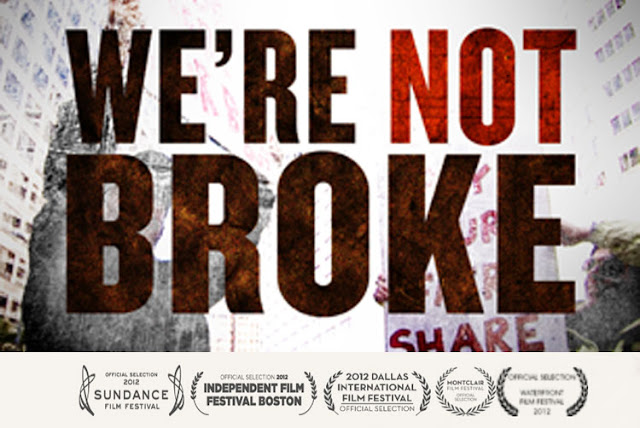


















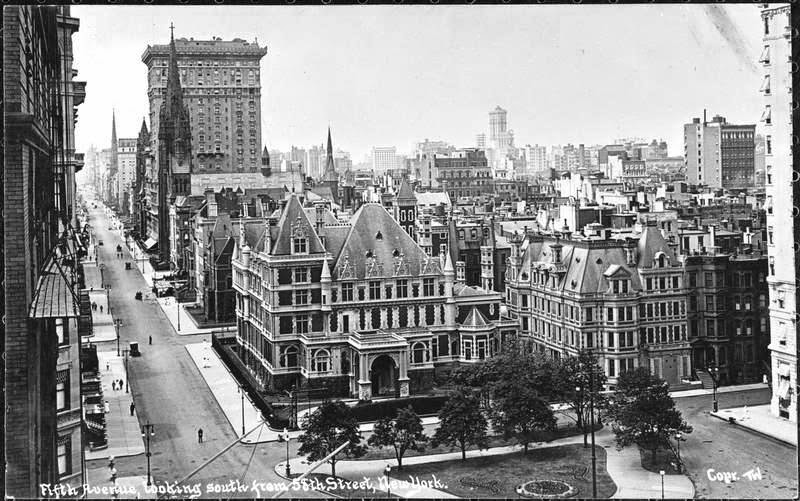












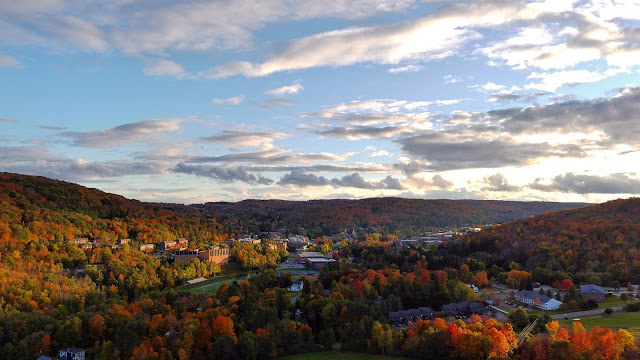




































.jpg)










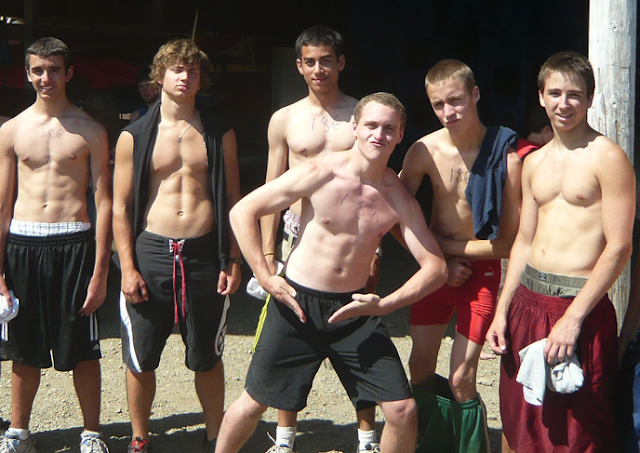

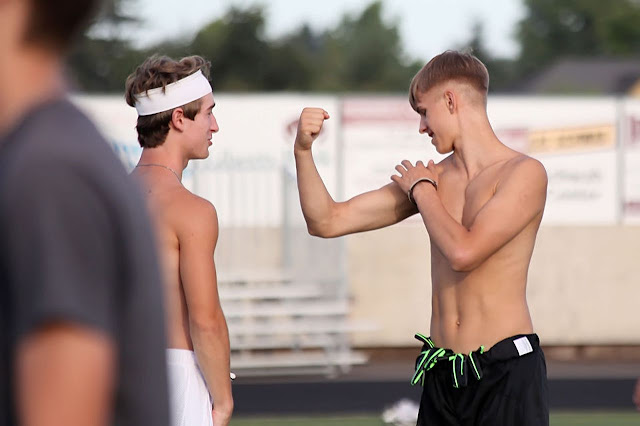
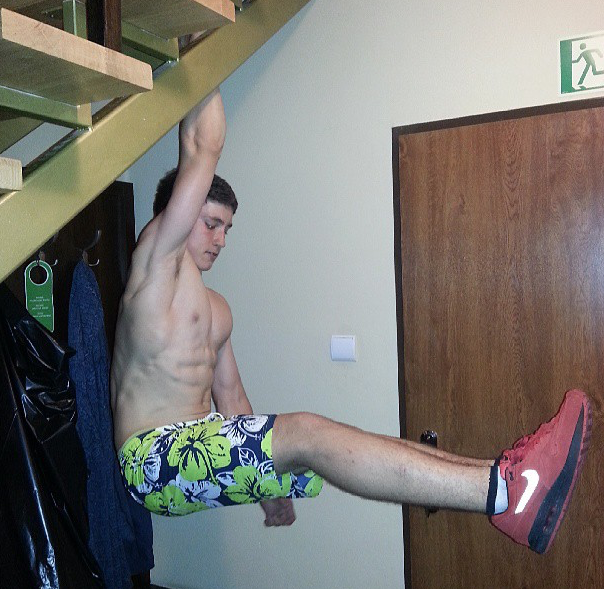



















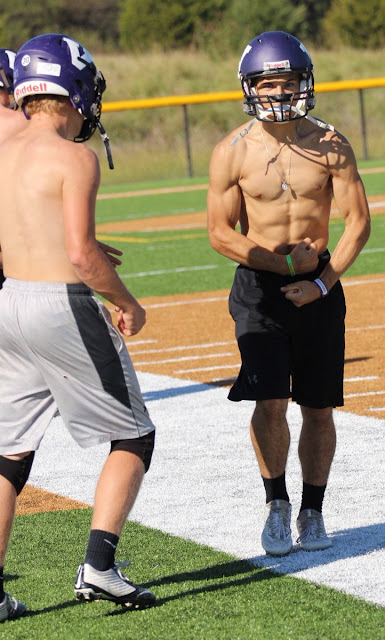



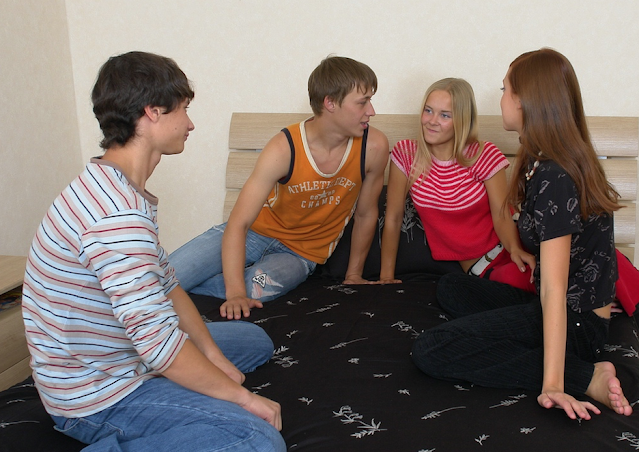




























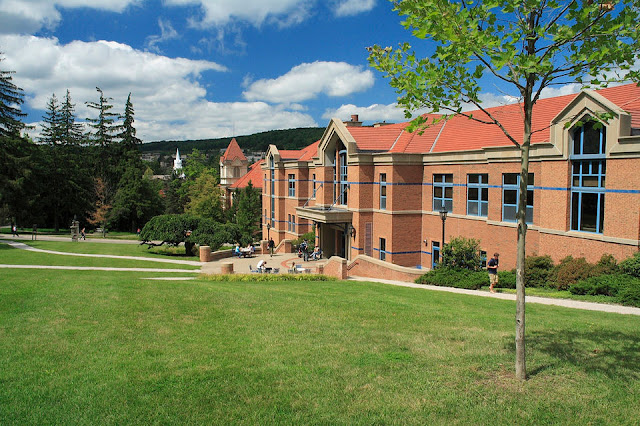




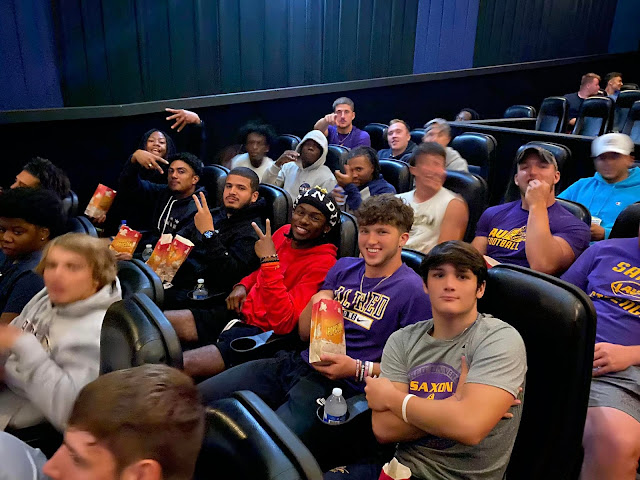




































































































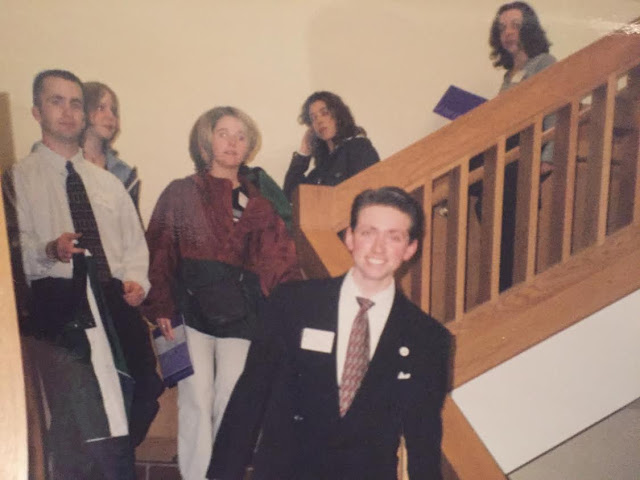


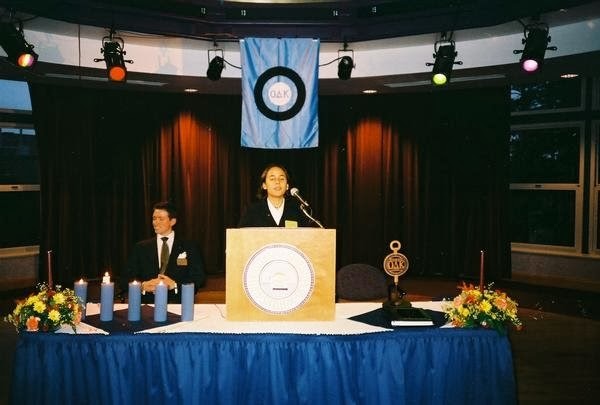













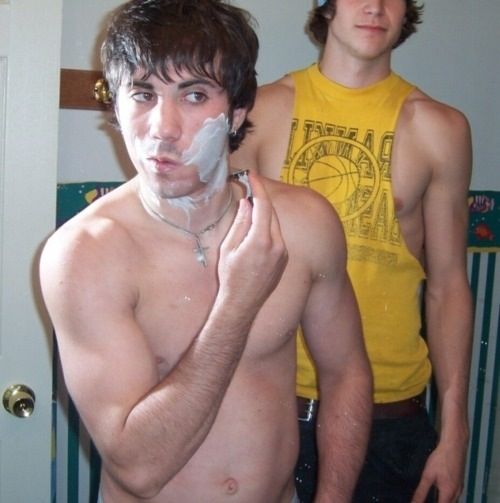














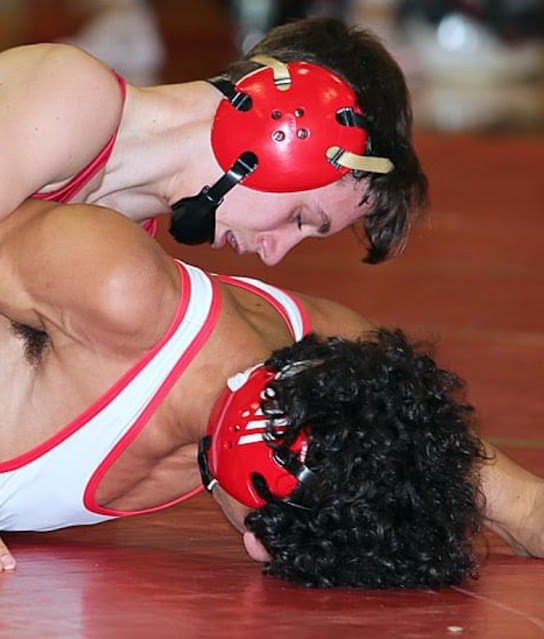






































.jpg)

























.jpg)




























